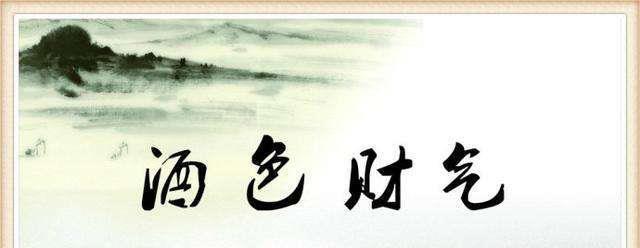Wine-colored money
In our folk, there is such a saying: color is a scraping steel knife, colorless people break the road.
Of course, this saying is an excerpt. The full edition explores what attitude the world should have towards "wine-colored wealth": Historically, there have been too many people who have suffered losses because of "wine-colored wealth", such as:
Xia Jie of the Xia Dynasty led to the fall of the country because of good wine;

In the Spring and Autumn Period, Wu Wang Fuchai indulged in the beauty of Xi Shi, which eventually led to the demise of the State of Wu;
Deng Tong, a courtier of the Han Dynasty, was eventually "cut off by the Han Jing Emperor" because he was rich and rich enough to rival the country;
Zhou Yu of the Three Kingdoms died because of his competitiveness and "qi".
Therefore, the ancients formed a prejudice that "wine-colored wealth" was corrupting people. And some people think that the problem is not the "wine color wealth" itself, but that people cannot withstand the temptation.
Behind the colloquialism of this article is the discussion of "wine-colored wealth" by some historical celebrities.
Historical stories
The story takes place at the Xiangguo Temple in the Great Song Dynasty. It was during the reign of Emperor Shenzong of the Song Dynasty. It is said that on this day, the great talent Su Dongpo went to Xiangguo Temple to find his friend Buddha Seal Zen Master, and this day it happened that the Buddha Seal Zen Master was not there. However, Su Dongpo saw a poem left by the Buddhist Zen master on the wall of Xiangguo Temple, and roughly believed that "wine-colored wealth" was a wall of imprisoning people, and only those who jumped out of these four walls could live a long life - this is the same as the concept of contemporary people, that if you don't want to do anything, you can't do anything.
Su Dongpo disagreed with this, so he and four poems, believing that "wine-colored wealth" itself is no problem, as long as people can correct their attitudes, they can not be harmed.
About a few days later, the ambitious Emperor Shenzong Tianzi and the chancellor Wang Anshi went out on a tour. I also came to Xiangguo Temple, and happened to see two poems left by the Buddhist Zen Master and Su Dongpo, so the two Junchen also discussed this topic.
Emperor Shenzong of Song ordered Wang Anshi and four poems. As we all know, in the era of Renzong in the Northern Song Dynasty, there were many social problems, and Song Renzong once implemented the "New Deal to Celebrate the Calendar" to solve these problems, but they all ended in failure. Emperor Shenzong of Song also hoped to solve the internal problems of the Great Song Dynasty through reform, and Wang Anshi was the leader of the reform faction.
The problems of the Great Song Dynasty boiled down to two things: one was a financial problem, and the other was a problem of external troubles. So Wang Anshi and four poems, Wang Anshi believes that as long as the "wine color wealth" is properly applied, it can benefit the imperial court and the people, of which "colorless people break the road" is from this.
After Song Shenzong read it, he also composed four poems with great interest, and also expressed a positive attitude towards the reasonable side of "wine-colored wealth".
Conclusion: Since ancient times, there have been many reasons for the destruction of the country and the destruction of the family. Some blamed fine wine, some blamed women, some blamed worship of Buddha (such as Emperor Wu of Liang), some blamed literature and art (Song Huizong), and even more bizarrely blamed the reason for the subjugation of the country on his love of reading (Emperor Liang Yuan). However, the monarchs concerned were reluctant to admit that the main cause was their own weakness, and the historians kept a secret for His Holiness, and in the end, they misled the readers of later generations, believing that there was really a "red face and bad water".